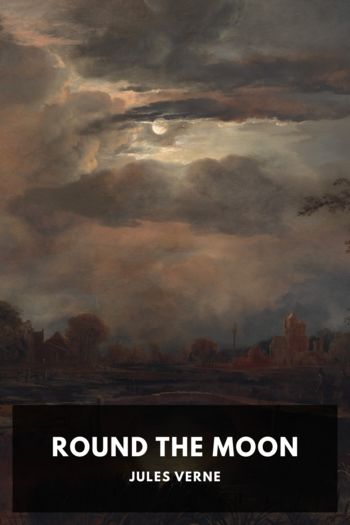Topsy-Turvy by Jules Verne (best book recommendations .txt) 📕

- Author: Jules Verne
Book online «Topsy-Turvy by Jules Verne (best book recommendations .txt) 📕». Author Jules Verne
In regard to Holland, there were her sailors Barentz and Heemskerk, who had visited the Spitsbergen and the New Zealand about the end of the sixteenth century. It was by one of her children too, Jean Mayen, through whose courageous campaign against the north the island which carries his name came in their possession. It is situated below the 72nd degree of latitude. Therefore Holland thought her past had given her rights of possession. In regard to Russia, with Alexis Tschirikof, having Behring under his command; with Paulutski, whose expedition advanced in 1751 beyond the limits of the ice-pack; with Capt. Martin Spangberg, and Lieut. William Walton, who dared to go into these unknown parts in 1739, she had taken a notable part in the search across the gulf which separates Asia and America.
Furthermore, the position of the Siberian territories, extending over 120 degrees to the extreme limits of Kamchatka, the length of the Asiatic coast, where the Samoyedes, Yakoutes, Tchuoktchis, and other conquered people lived, did Russia not rule half of the Northern Ocean? And then, on the 75th parallel to within less than nine hundred miles from the pole, did she not possess the islands of the new Siberia, the Archipelago of Liatkow, discovered in the beginning of the eighteenth century? And finally, since 1764, before the English, before the Americans, before the Swedes, did not the navigator Tschitschagoff search a passage in the North to shorten the route between the two continents? However, notwithstanding this, it seemed that the Americans were more anxious to become possessors of this particularly inaccessible point of the globe than anyone else.
They had often tried to obtain it by devoting themselves to the search of Sir John Franklin, with Grinnel, with Kane, with Hayes, with Greely, with De Long, and other courageous navigators. They could also plead the geographical situation of their country, which develops itself below the polar circle from the Behring Sea to Hudson’s Bay. And were not all these countries, all these islands-Wollaston, Prince Albert, Victoria, King William, Melville, Cockburne, Banks, Baffin, not counting the thousand small pieces of the archipelago—like a leaf spreading to the 90th degree? And then supposing that the North Pole should be attached by an uninterrupted line of territory to one of the large continents of the globe, would it not be more to America than to Asia or Europe? Therefore, nothing was more natural than the proposition to purchase this region by the Federal Government for the benefit of an American society.
If any power had undisputable modern rights to possess the polar domain it was certainly the United States of America. It must also be considered that the United Kingdom of Great Britain, which possessed Canada and British Columbia, numerous sailors of which had distinguished themselves in these Arctic countries, urged very good reasons for annexing this part of the globe to their vast empire. And its journals discussed the matter at great length. “Yes, without a doubt,” answered the great English geographer, Kliptringan, in an article in a London newspaper, which made a great sensation; “yes, the Danes, the Hollanders, the Russians, and the Americans, can be proud of their rights.” As for England, she did not wish to let this country escape her. Did not the northern part of the continent already belong to them? Have not these lands, these islands which composed them, been discovered and conquered by English discoverers since Willoughby, who visited Spitsbergen and New Zealand in 1739, to McClure, whose vessel made in 1853 the passage of the northwest? And then were not Frobisher, Davis, Hall, Weymouth, Hudson, Baffin, Cook, Ross, Parry, Bechey, Belcher, Franklin, Mulgrave, Scoresby, MacClinton, Kennedy, Nares, Collinson, Archer, all of Anglo-Saxon origin? And what country could make a more just claim on the portion of these Arctic regions that that which these navigators had been able to acquire? “Well,” said a California journal, “let us put the matter on its real point, and as there is a question of amour-propre between the United States and England, let us ask, If the English Markham of the Nares expedition had gone 83 degrees 20 minutes of latitude and the Americans, Lockwood and Brainard, of the Greely expedition, went to 83 degrees 35 minutes, to whom then does the honor belong of having come nearest to the North Pole?”
Such were the demands and explanations, but one could see that the struggle would only be active between American dollars and English pounds sterling. However, according to the proposition made by the North Polar Practical Association all countries had to be consulted and given a chance at the auction. The sale was announced to take place Dec. 3, at Baltimore. The sum realized by the sale was to be divided among the States which were unsuccessful bidders, and they were to accept it as indemnity and renounce all their rights in the Arctic regions for the future.
The delegates, furnished with their letters of credit, left London. The Hague, Stockholm, Copenhagen, and St. Petersburg, and arrived three weeks before the day fixed for the auction sale.
Up to this time America had only been represented by Mr. W. S. Forster, of the North Polar Practical Association.
The delegates of the European powers who had been chosen were included in the following list:
For Holland—Jacques Jansen, formerly Counsellor of the Netherlandish India; fifty-three years old, stout, short, well formed, small arms, small bent legs, round and florid face, gray hair; a worthy man, only a little incredulous on the subject of an undertaking the practical consequences of which he failed to see.
For Denmark—Eric Baldenak, ex-Sub-Governor of the Greenlandish possessions; of medium height, a little bent over, large and round head, so shortsighted that the point of his nose would touch his books; not willing to listen to any claim denying the rights of his country, which he considered the legitimate





Comments (0)